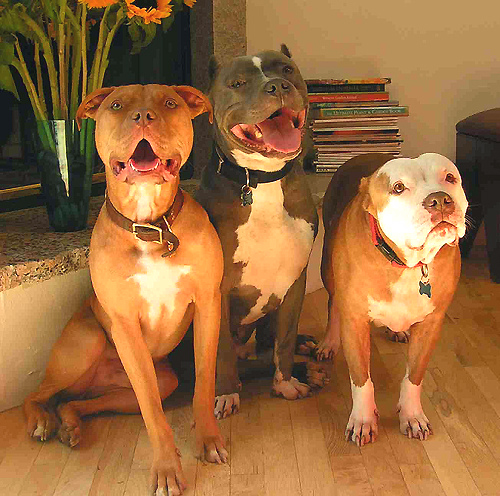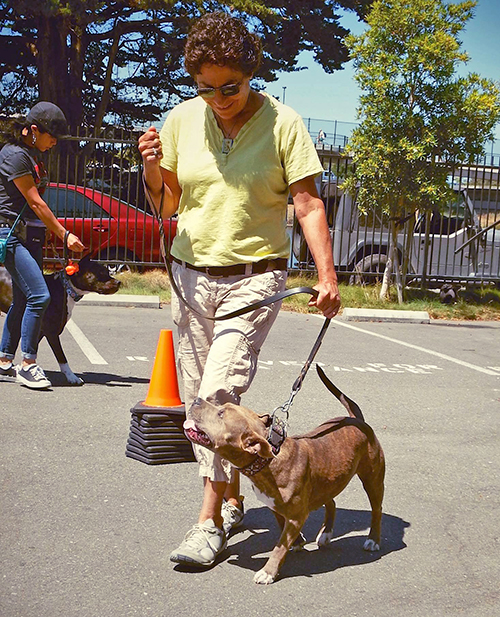A Socializing Quiz. Test your smarts!
 1. True or False?
1. True or False?
Smart Socializing involves setting your dog up for success with the most positive dog-dog interactions.
TRUE – The more positive interaction ANY dog gets with other dogs, the more likely he will develop and maintain dog-tolerant behavior for life.
Right: This female puppy’s all-positive exposure to well socialized adult dogs was planned for her benefit. Her mother was ‘Dog Selective,’ meaning, she was easily offended by rude behavior from strange dogs. Meg the pup inherited the same traits later in life, but good early socialization and smart management set her on the path for enjoying trusted dog friends as she matured.
2. True or False?
Dog Parks are a dependable place for positive dog-dog socializing opportunities.
FALSE – While Dog Parks can be fun, they also bring negative interactions by forcing your pet to come up against dogs that may be overly stimulated, short-tempered, outwardly aggressive or otherwise badly managed. Smart Socializing means keeping your friend dog-tolerant, and that involves AVOIDING dicey situations where conflict can spark. Read up on Dog Parks.
 3. True or False?
3. True or False?

FALSE – The friendship an adult dog forms with one dog will not necessarily translate to strange dogs. It’s completely normal for adult dogs to be picky about new dog friends, and to require slow, staged intros to support the best interactions. See video at bottom of page for our best tips on intros.
Right: These housemate dogs are great pals, but one is decidedly ‘Dog Aggressive’ with strange dogs, one is ‘Dog Selective,’ while the third dog is completely ‘Dog Social.’ When you want to socialize your dog, it’s important to know his individual limits so you don’t set him up for a bad experience. Read About Dog Tolerance Levels
4. True or False?
Opposite sex housemate dogs tend to have fewer problems than same sex pairings, especially when both are fixed.
Mostly TRUE – When looking for a second dog or a playmate for your dog, start by searching for well socialized dogs of the opposite sex.
Did You Know? A study on dog/dog aggression found that problems between housemate dogs are far more common with same-sex pairs. This is especially true for female pairs. Study
5. True or False?
I heard that fights we see at dog parks are just dogs’ way of working things out. Isn’t it helpful to let them learn how to take care themselves around other dogs?
FALSE – A dog’s first fight is always the one you want to avoid. Why? A bad fight can make a huge impression on your dog and cause him to have a shorter fuse the next time a dog-dog conflict comes up. Dogs learn from their bad experiences just like we do, so it’s best to protect them from conflict.
TIP: Protect Your Dog from a Bad Dog-Dog Experience.
Dogs don’t need to ‘prove’ that they can be buddy-buddy with all other dogs. A Good Goal: Make sure your dog can calmly tolerate the presence of other dogs when he’s on-leash. Another Good Goal: Help your dog enjoy dogs by developing a small handful of favorite play partners for supervised fun in safe, contained areas. Skip the dog parks. No really, skip the dog parks.
6. True or False?

FALSE – Yikes, no. Leash greets can be a very challenging way for any two strange dogs to meet and a sure bet way to set the wrong two personalities up for a loud argument. Also, allowing your dog to do this will encourage him to pull like crazy towards any dog he sees. The tension that builds from the excitement of a rushed greeting can escalate into leash frustration for him and yanked shoulders for you Not fun!
Right: This handler is rewarding her dog for ignoring the passing dogs in class. With practice, Cricket is able to stay calm and ignore other dogs on-leash without any prompting. No more pulling at the leash to see dogs – and the public gets to see perfect manners!
TIP: Practice Defensive Driving with Your Dog:
If someone insists on rushing their dog up to meet yours, just hold out your hand, step in front of your dog, smile brightly and say, “Sorry! We’re in training right now!” or “Sorry! My dog has kennel cough” – a fib with function. Don’t be shy. It’s our responsibility as dog owners to protect our pets from potentially negative experiences. It’s perfectly OKAY for your dog not to greet every dog he encounters.
Smart Tips for Introducing Two Dogs for a Play Session:
|


 1. True or False?
1. True or False? 3. True or False?
3. True or False? See VIDEO below!
See VIDEO below!
